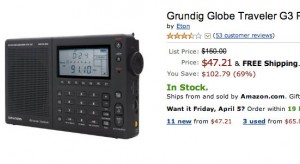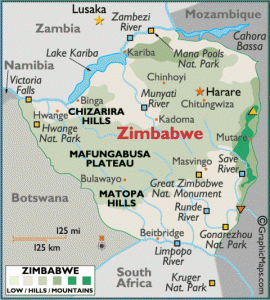It is my sincere hope that, somehow, RNW’s voice will once again find the means to speak for those in need of free press.
Even 33 years after winning the fight for independence, Zimbabwe’s President Robert Mugabe remains a harsh critic of the white colonial government’s system. But with his recent ban on radios, he is imposing the same oppressive tactics that he himself once fought against to liberate his people.
By Nkosana Dlamini, Harare
As I write, Zimbabwe’s statutes are being stiffened with the state oppression that Mugabe himself once fought against. A case in point is the state’s recent banning of small wind-up radios with a short-wave dial.
To understand better, let’s first rewind a few decades…
Chiefs and Commandos
Zimbabwe, formerly Rhodesia, gained independence in 1980 after a protracted guerrilla war. At its peak, in the 1970s, the two main fighting movements, ZIPRA and ZANLA, established exiled radio stations in neighbouring countries where their fighters received training. These stations broadcast into Zimbabwe via short and medium-wave. It was the way to communicate with the local villagers who supported the war by sharing intelligence and foodstuffs.
But in a bid to thwart enemy operations, Ian Smith, the last white Rhodesian ruler, developed strategies that forced radios to be fitted with frequency modulation (FM), as opposed to short wave.
Manufactured by local Zimbabwean firms, Smith’s FM radio sets were branded with the name ‘Chief’.[…]Other radios were manufactured under the name ‘Commando’ and distributed to soldiers in the bush. The government’s intention here was to keep spirits up with music and programmes in which troops could request favourite songs and relay messages about their welfare to loved ones.
Mugabe’s heavy hand
Smith claimed – as Mugabe does now – to be shielding people from pirate stations broadcasting hate speech. In both eras, locals have been instilled with fear. They have had to resort to listening to exiled stations from under the blankets and in their barns, anxious that their neighbours might see them using forbidden radios.
[…]Even under Zimbabwe’s stringent laws today, it is not a crime to own a radio receiver. But, by day, Mugabe’s state agents confiscate the radios and harass citizens found in possession of them – a practice that gets revved up each time a Zimbabwean election looms. By night, the same agents return home to tune into exiled stations via the radios they’ve confiscated. In some instances, they distribute them among their relatives.
The state says it is confiscating the receivers because they are being brought into the country by NGOs without paying a customs fee. In some instances, the do admit they are trying to prevent ordinary citizens from accessing exiled Zimbabwean radio stations through shortwave – a unique feature in these radios.
In other ways, too, Mugabe has proven worse than his predecessor. He has made repeated attempts to scramble these stations’ signals. He is also allegedly responsible for the 2002 bombing of exiled station Radio Voice of the People and the 2000 and 2001 bombings of independent newspaper The Daily News.
Today’s listener
But Mugabe may be fighting a losing battle. Technological advances are no longer so slow. Today’s listener is not only more stubborn, but also more able to access alternative media sources such as the internet and digital satellite broadcasters.
Radio is also accessible via cell phone and computer. Most Zimbabweans now own cheap Asian-import cars fitted with radios that can access Studio 7, the exiled station most despised by Mugabe which has coverage even wider than that of the FM state broadcaster, Zimbabwe Broadcasting Cooperation (ZBC). Radio Voice of the People and Short Wave Radio Africa are two other exiled stations that attract a generous listenership.
And the stricter Mugabe gets about the ban’s imposition, the more ravenous becomes the appetite of Zimbabwean citizens. They want to hear precisely what the state broadcaster cannot – or will not – put in their domain.
 Last year, we mentioned that a documentary film featuring the RCI Sackville transmitter site was in the works. Fortunately, artist/film maker Amanda Dawn Christie, is on track for production of Spectres of Shortwave. Though the film has already received $70,000 in cash funding and $17,500 in services, they need an additional $10,000 to cover incidentals, so they’ve launched an indiegogo campaign.
Last year, we mentioned that a documentary film featuring the RCI Sackville transmitter site was in the works. Fortunately, artist/film maker Amanda Dawn Christie, is on track for production of Spectres of Shortwave. Though the film has already received $70,000 in cash funding and $17,500 in services, they need an additional $10,000 to cover incidentals, so they’ve launched an indiegogo campaign.




